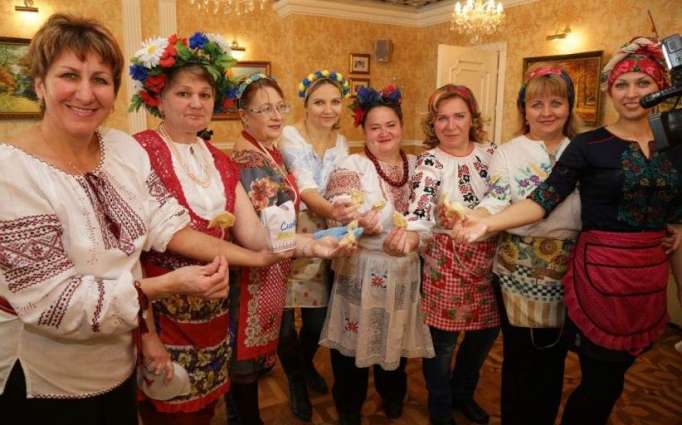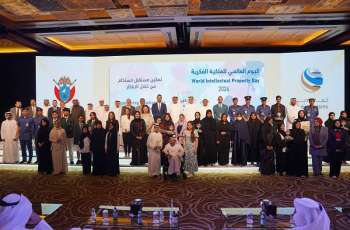The wives of foreign ambassadors to Russia spoke with Sputnik ahead of the International Women's Day about the traditions of celebrating the holiday in the country, their life in Moscow and how they help husbands with their duties
MOSCOW (Pakistan Point News / Sputnik - 07th March, 2019) The wives of foreign ambassadors to Russia spoke with Sputnik ahead of the International Women's Day about the traditions of celebrating the holiday in the country, their life in Moscow and how they help husbands with their duties.BEING AMBASSADOR'S WIFE ALSO JOB
Patience Sago, the wife of Zimbabwe's ambassador, has been living in Moscow for four years. The time spent in Moscow got the couple used to the country's many months of cold and snow.
"You know, even when it's summer here, we think 'When will it start snowing?' You, actually, miss the cold. In September, we all get surprised leaves are falling, we see that fall is coming. The change of seasons here is very explicit, unlike Africa, where it is always warm, hot," Sago said.
Speaking about her role of an ambassador's spouse, she said that she had her own responsibilities.
"We are not just spouses, we complement [our husbands], we also represent our country. It is also a job of some kind, I may say so," Sago said.
With this status comes many meetings with representatives of different countries and cultures, which enables ambassadors' spouses to promote the positive image of their home countries and learn more about the world, Sago added.
Speaking about the upcoming holiday, Sago said that she admired the way International Women's Day was celebrated in Russia.
"I like the importance that is being attached to this holiday in Russia. Since I came to this country, I have always been invited to events marking March 8 [International Women's Day]. If I return to my home country, I would like to raise [public] awareness of [the holiday], create programs like here. It is an important holiday, I like the fact that we, women, are being appreciated mothers, sisters, girls, all," Sago indicated.
According to Sago, her husband, Mike Nicholas Sango, also participates in the celebrations.
"It is nice that we are given flowers, chocolate on this day. It is something new for my husband and now he also follows the tradition," Sango said.
Afrah Mohammed Faddaghi, the Kuwaiti ambassador's wife, has also been impressed by the scale of Women's Day celebrations in Russia and now introduces them to her relatives and friends in Kuwait via social networks.
"We have been traveling around the world, but we have never seen such celebrations and such respect for women as here, in Moscow ... As a woman, I believe that we deserve such attention, because a woman is not just a mother, but also a wife and a daughter who can give to others even more than men. We are, indeed, strong and can make something from nothing," Faddaghi added.
Faddaghi has been living in Moscow for five years. She recalled that when she and her husband learned that they were due to be sent to Moscow, they were a little frightened since there was little information about daily life in Russia in media only news about political events.
However, all their fears were allayed upon their arrival in Russia. The couple fell in love with the capital, its beauty and its warmhearted residents.
The only problem Faddaghi said she and her husband had faced was the language barrier. But, she did point out that over the past five years the number of people with a good command of English had increased significantly.
Haifa Bou Nassar, the wife of the Lebanese ambassador, said her home country also had a holiday that celebrated women.
"In Lebanon, March 21 is a day of spring and mothers. Mothers are celebrating it. The dates differ a little bit, but wherever we are, we are celebrating with the country where we reside," Bou Nassar said.
The couple has spent many years in Moscow. Her husband, Chawki Bou Nassar, used to be charge d'affaires at the Lebanese Embassy in Russia before returning to the country to head the Lebanese diplomatic mission six years ago. The couple are well acquainted not only with Moscow but also with St. Petersburg.
"Wherever you are traveling in Russia or in Moscow, you can find something with a cultural value, something that will make you learn [new things]. That is why it is such a great country," Bou Nassar said.
Speaking about the difficulties of living in Moscow, she mentioned the language barrier and transportation problems. She specified that she found some difficulties in using the subway, despite its convenience.
"We were on the subway for sightseeing, but if you need to attend an official event, it is impossible to use subway since you can hardly get from one place to another in the subway, wearing, for example, high heels. But [the subway] itself, some of the stations that we visited, is a piece of art. Maybe, we will change our mind and start using it," Bou Nassar added.
ONE CANNOT LOVE MOSCOW ONLY ADMIRE
Gopa Chokroborty, the Bangladeshi ambassador's wife, on the contrary, is no stranger to the Moscow subway. She practically grew up in Moscow, arriving in the capital as a student to study at the Sechenov First Moscow State Medical University and then returning for postgraduate training. She came back to Moscow for a third time with her husband in 2009.
"I was a student back then, so I lived underground, in the subway it is there that you do you homework, there you sleep, you do everything there. And now I live above the ground I drive my car. Now I see how beautiful Moscow is. What I like about Moscow most and what you'll never see in other cities cities [usually] have a kind of central area, but this is not the case in Moscow. You're driving around the city and suddenly a beautiful building, you move on and see another one. And it is sort of spacious," Chokroborty said.
She said that she very much enjoyed Moscow's parks, where she could walk and focus on her health.
"Moscow is like a lady, it should be admired. Other [cities] might attract, and Moscow needs your adoration," Chokroborty said.
Chokroborty mentioned the city's numerous museums, theaters and concert halls, where she spent a lot of her time, as another unique feature of the Russian capital.
"I am Indian and we have very beautiful literature. I believe that people are the same everywhere, no matter [where]. And literature, culture bring people closer together. When I am in a theater, I think 'We would view this the same way' or 'We also think this way,'" Chokroborty remarked while stressing that these similarities existed despite the geographical distance between the two countries.
EVERY SUCCESSFUL MAN HAS WOMAN BEHIND HIM
Feruze Samsar, the wife of the Turkish ambassador, also has strong ties with Russia. Samsar, born in the former Uzbek Soviet Socialist Republic, considers the Russian language to be her mother tongue.
"The Russian language is my native language. I met my husband in Uzbekistan, he was a third secretary at the embassy at that time. Since then, I have been living in Turkey, for 20 years already," Samsar stated.
She added that since she grew up in the Soviet Union she used to visit Moscow frequently.
"But Moscow surprised me a lot [after coming back with the ambassador], and I was fascinated by the changes. Moscow is not just moving forward, it is hurtling ahead," Samsar said.
According to Samsar, she has managed to form her own vision of women's role in society over the years that she spent accompanying her husband in missions abroad.
"There is a successful woman behind every successful man, but a woman is valued in the society not only as a mother, and her place is not always behind a man more frequently it is near or even in front of him. There were, are and will be successful women in business, science, art and politics," Samsar said.




